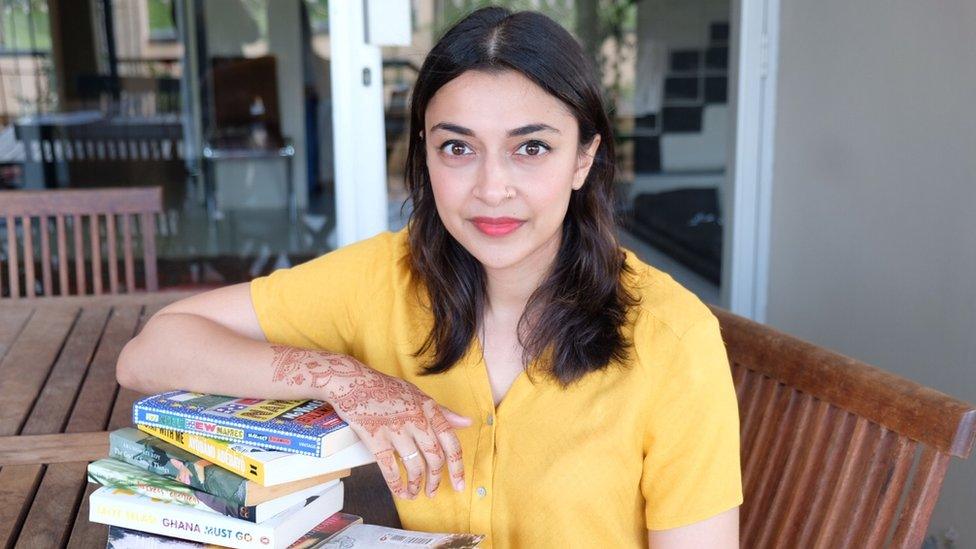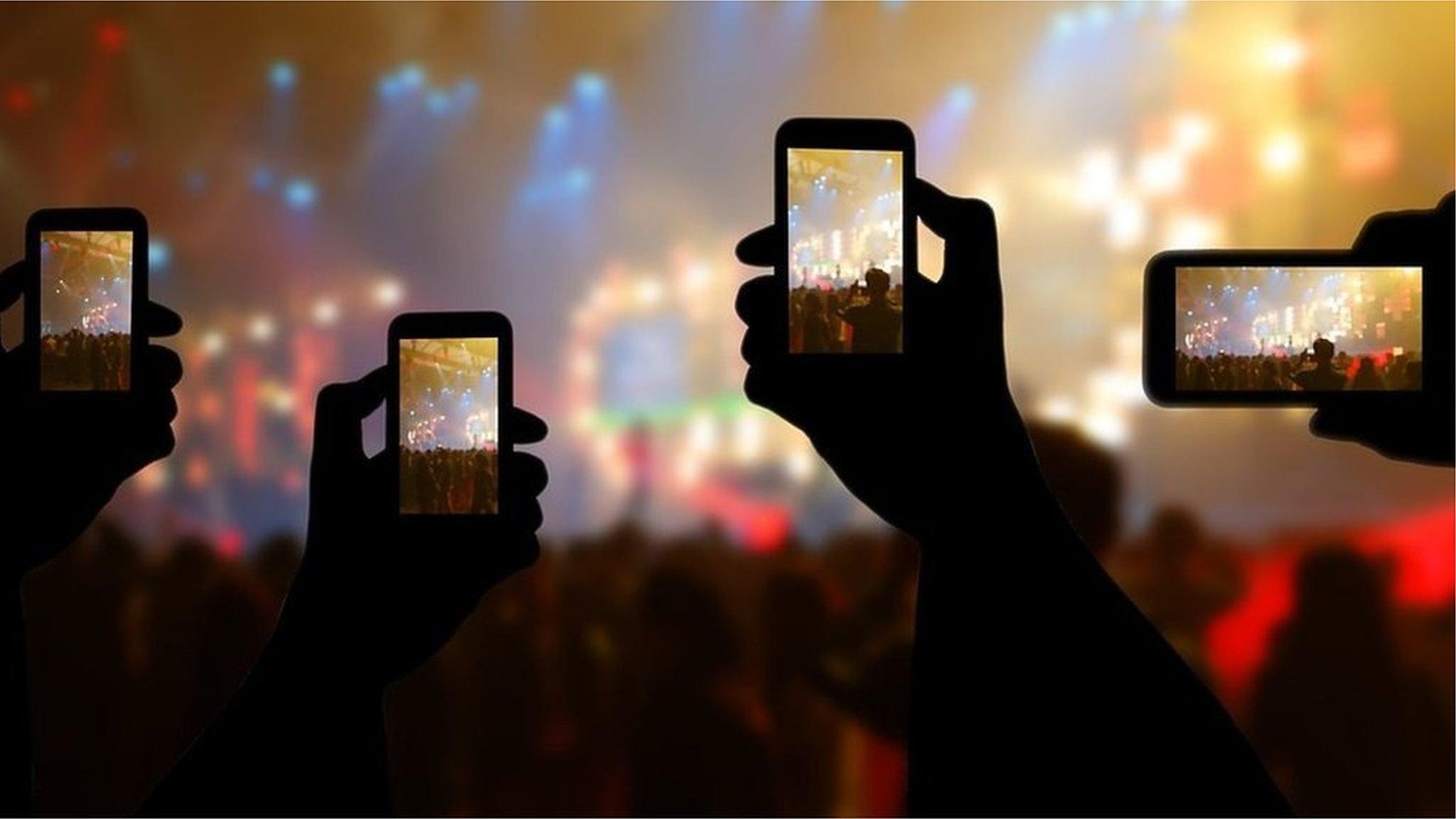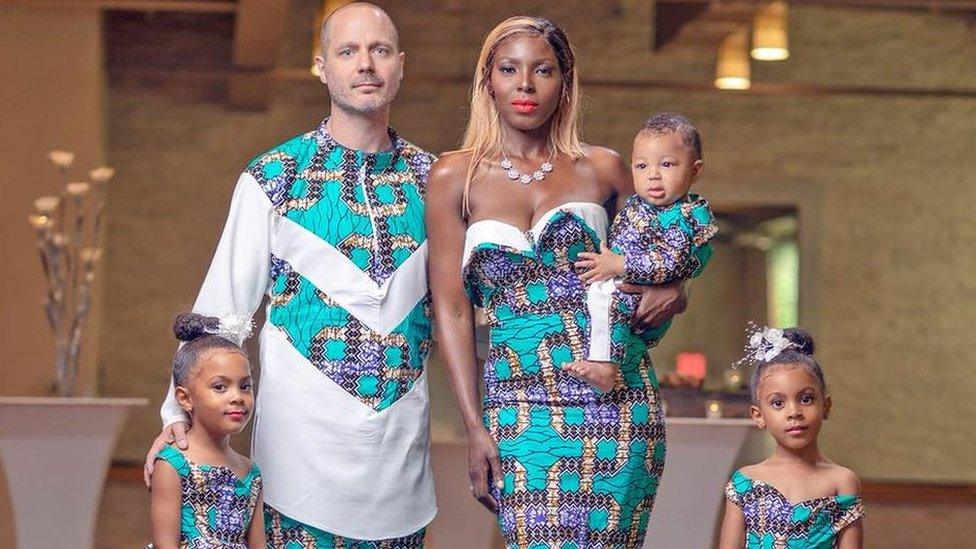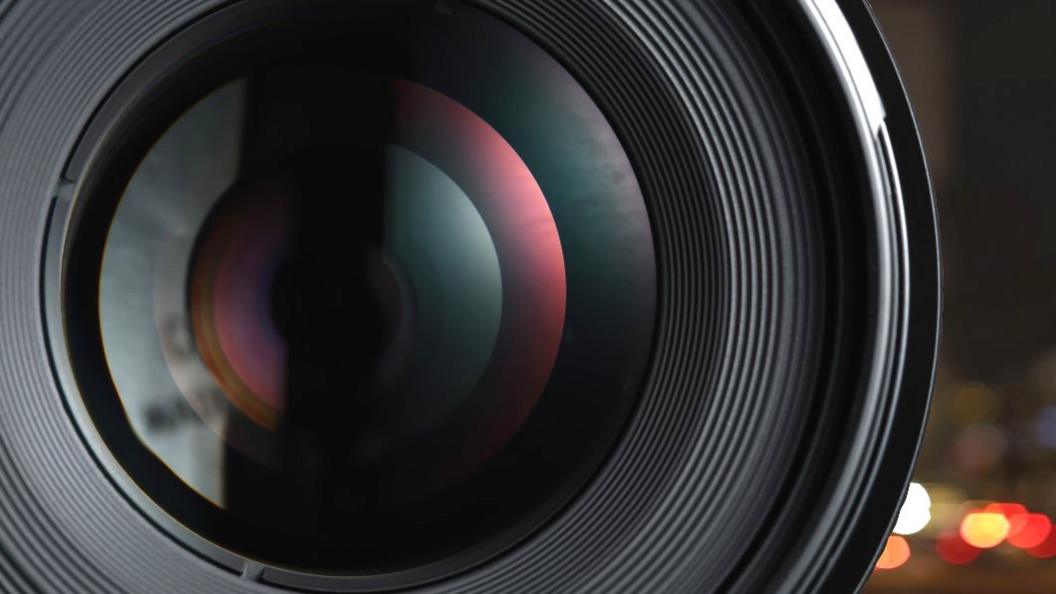The face behind a stock image: How I gave away my face for free
- Published

Shubnum Khan has shared a cautionary tale as the face behind a stock image
If she is not welcoming immigrants to Canada and Uruguay, Shubnum Khan is selling carpets in New York City, leading treks in Cambodia or looking for love in France.
Her face has been on a McDonald's advert in China and one for sedation dentistry in Virginia.
But the truth is, the South African author and artist has done none of these things.
It all started in 2012 when a friend in Canada posted a picture to Shubnum's Facebook page. It was an advert promoting immigration in a Canadian newspaper.
"This looks like you," the friend posted, and others responded saying it was definitely her.
"I didn't mind being in immigration ads but I was very confused," she tells the BBC from her home in Durban, South Africa.
"I couldn't understand why my face was in a paper all the way on that side of the world."
That is when another friend stepped in and said: "Hey, didn't we do a photo shoot a few years ago, remember?"
'We didn't read the small print'
Two years earlier, a 24-year-old Shubnum and some university friends had gone to a free photo shoot she had heard about called the 100 Faces Shoot.
The photographer promised 100 people professional portraits in exchange for being snapped.
"I thought the picture would be used for his portfolio, or an art project," recalls the now 33-year-old author. "People remember hearing mention of an art project."
"It's very quick - you sign a piece of paper, you go in, the photographer says smile for a picture. It is quick but I definitely was not told it would be for a stock picture."
Allow X content?
This article contains content provided by X. We ask for your permission before anything is loaded, as they may be using cookies and other technologies. You may want to read X’s cookie policy, external and privacy policy, external before accepting. To view this content choose ‘accept and continue’.

"Initially I thought it was really funny," Shubnum says of her finding various versions of the stock image. "But over time, there were so many photos and I never got any money for this."
She contacted the photographer who confirmed she had signed away the rights to the photos and that they were now stock images that he sells.
"We signed a release form at the start," Shubnum recalled in a recent tweet, "We didn't read the small print. I know. It was stupid."
'It was so dishonest'
Someone told Shubnum about how to do a Google reverse image search, which allows you to find images that are similar to the one you search with.
"I've definitely seen more than 50 [versions]," she says. "It's a famous face without anyone really knowing me."
Many of the adverts seemed innocent enough to her, but then she came across the fake testimonials.
Allow X content?
This article contains content provided by X. We ask for your permission before anything is loaded, as they may be using cookies and other technologies. You may want to read X’s cookie policy, external and privacy policy, external before accepting. To view this content choose ‘accept and continue’.

Allow X content?
This article contains content provided by X. We ask for your permission before anything is loaded, as they may be using cookies and other technologies. You may want to read X’s cookie policy, external and privacy policy, external before accepting. To view this content choose ‘accept and continue’.

"The testimonials are the most shocking for me," she says. "I thought I understood how stock images work, you know, like having a picture of a house to illustrate a house.
"But it was so dishonest, I never knew you could use stock images with false testimonials and fake names."
The ones that bothered her the most were where her blemishes were edited out for an after-photo promoting a beauty product and when her name was changed with a fake history of post-pregnancy melasma.
Allow X content?
This article contains content provided by X. We ask for your permission before anything is loaded, as they may be using cookies and other technologies. You may want to read X’s cookie policy, external and privacy policy, external before accepting. To view this content choose ‘accept and continue’.

By 2013, it was getting too much so she contacted the photographer again to appeal for his help.
"I actually had to work up the courage to ask him because I thought he'd say no," she recalls of the exchange. "I said I knew we signed this thing, but I didn't realise that my photo would go like that.
"He explained he was sorry I felt hard done by but it was all legal and explained to us beforehand," Shubnum tweeted. "But he agreed to take it down from his site since I complained as an author I could be recognised."
Shubnum is adamant she was never told that the photographs taken when she was a university student would be used as stock images.
She adds: "No-one told me that it would be a stock image, no-one told me my name would be distorted. If someone had told me that, I wouldn't have signed it."
Allow X content?
This article contains content provided by X. We ask for your permission before anything is loaded, as they may be using cookies and other technologies. You may want to read X’s cookie policy, external and privacy policy, external before accepting. To view this content choose ‘accept and continue’.

Cautionary tale
Of the 100 people who were photographed alongside Shubnum in 2010, a number have searched the internet for their own photo as a stock image.
The friends that accompanied her on that day have not found any, but Shubnum says she has heard from others who did.
Even though the photographer has obliged and removed her stock images, Shubnum has continued to find her face crop up on ads that had already bought her image.
Not as many as before, she is relieved to report, but the last one she saw was on a promotion to sell villas a few months ago.
Since her story went viral on Twitter, people have contacted her to share their own stock image discoveries, with some even saying her (fake) testimonial inspired them.
Allow X content?
This article contains content provided by X. We ask for your permission before anything is loaded, as they may be using cookies and other technologies. You may want to read X’s cookie policy, external and privacy policy, external before accepting. To view this content choose ‘accept and continue’.
Shubnum insists she does not blame the photographer who took her stock image and is not considering legal action.
It's a great party story, Shubnum says, but now she just wants to share her story as a cautionary tale.
"I can easily see how we were all used," she said. "I feel quite stupid and I don't want other people making the same mistakes.
"Don't sign up for free photo shoots, read what you sign and also don't believe most of the things you read on the internet," she tweeted.
"Just read the small print, obviously. Be aware," Shubnum warns. "Don't get caught up by the camera. Think about what you're doing and who is benefitting - know what you're getting into."
She adds: "You think it's a small thing but you sign away your face. Basically, I gave away my face for free."
- Published1 August 2018

- Published19 June 2018

- Published21 June 2018

- Published16 March 2017
